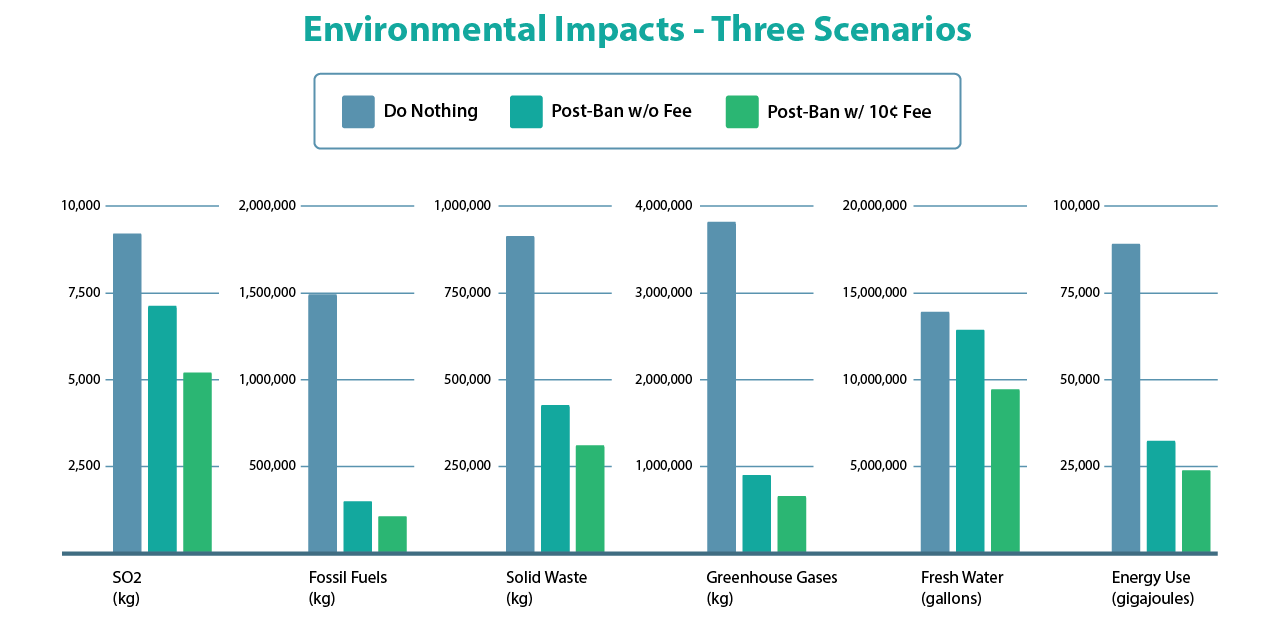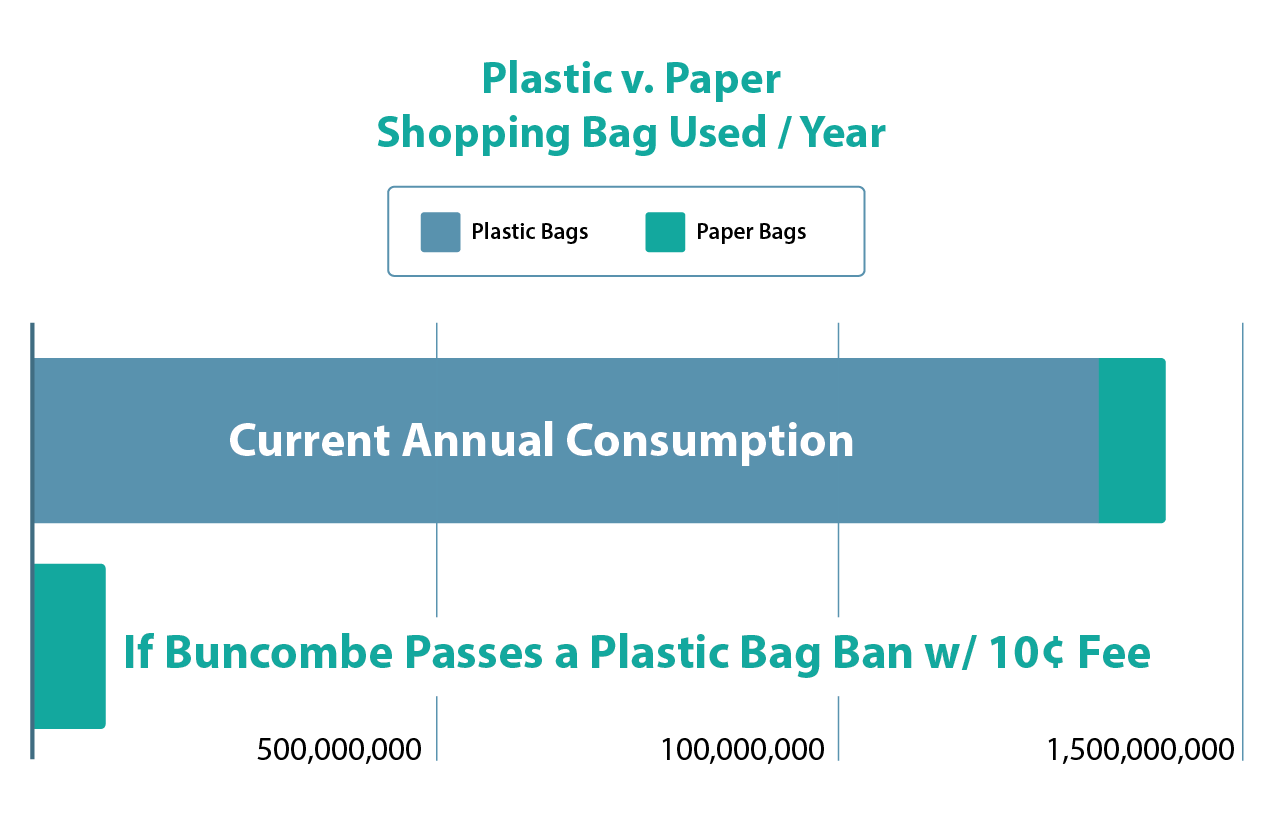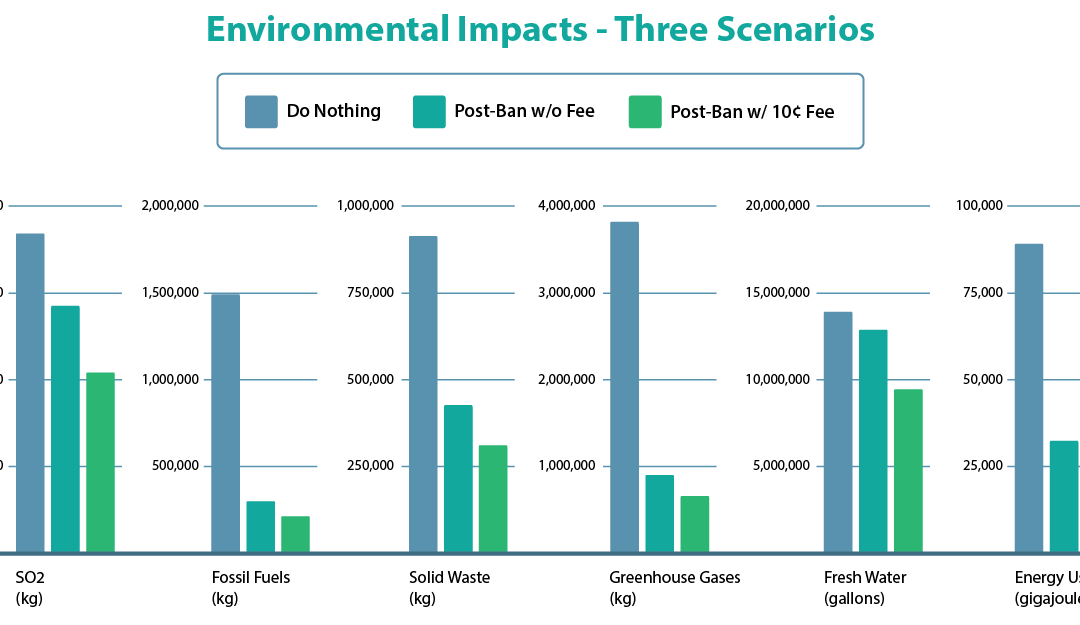A Plastic Bag Ban with a 10¢ Fee Is Best for the Environment with Limited Cost to Consumers
A plastic bag ban with a 10-cent fee on paper would dramatically decrease emissions of greenhouse gasses and sulfur dioxide, and the consumption of fossil fuels and fresh water at an annual cost of $3.33 per consumer — customers using EBT, SNAP, and WIC would be exempt.
Buncombe County, NC — A ban on single-use plastic grocery bags that includes a 10-cent fee on paper grocery bags would offer the highest environmental benefit to Buncombe County with limited costs for consumers, according to data assembled and analyzed by the local conservation organization MountainTrue.
Using environmental impact data provided by the American Chemistry Council — a group that lobbies and advocates on behalf of plastic bag manufacturers and the petrochemical industry — MountainTrue has calculated the environmental impacts of three scenarios: maintaining the status quo by doing nothing, adopting a plastic bag ban without a fee, and adopting a plastic bag ban that includes the 10-cent fee on paper.

Scenario 1 – Do Nothing: This scenario is based on current bag use multiplied by the per-bag environmental impacts as determined by the American Chemistry Council.
Scenario 2 – Post-Ban w/o Fee: This scenario assumes a conservative 50% increase in the use of paper bags after the passage of a plastic bag ban without a fee on paper bags. This is a high estimate based on data from cities that banned plastic bags without a fee on paper, which has shown increases in the range of 30%-50%.
Scenario 3 – Post-Ban w/ 10¢ Fee on Paper: This scenario assumes the passage of a plastic bag ban that includes a 10-cent fee on paper grocery bags and a corresponding 10% increase in the use of paper bags.
While either bag ban scenario would be dramatically better for the environment than maintaining our current addiction to cheap, single-use plastic, adopting a plastic bag ban that is paired with a 10-cent fee on paper grocery bags would bring about the largest reductions in waste, pollution, and energy consumption. A bag ban with a 10-cent fee on paper bags would reduce Sulfur dioxide (SO2) emissions by 43%, fossil fuel consumption by 86%, solid waste by 66%, greenhouse gas emissions by 83%, fresh water consumption by 32%, and energy use by 73.3%.
MountainTrue supports a plastic bag ban with a 10-cent fee on paper bags at the checkout aisle and has provided model ordinances to Asheville City Council and Buncombe County Commissioners that would additionally mandate that grocers use paper bags with at least 40% recycled content. This would further reduce environmental impacts. According to the Environmental Paper Network’s calculator, using recycled paper bags would reduce fossil fuel consumption by an additional 6.7% and greenhouse gas emissions by 30% compared to virgin paper.

These environmental benefits take into account expected increases in the consumption of paper bags after either bag ban would go into effect.

Using data and case studies from hundreds of localities that have already passed similar laws, MountainTrue estimates a 30-50% increase in paper bag consumption from a bag ban without a 10-cent fee on paper bags. MountainTrue’s preferred policy option, a bag ban with the fee, would result in a much smaller increase in paper bag consumption — approximately 10%.
Currently, Buncombe County residents use approximately 132.4 million plastic shopping bags and 8.23 million paper shopping bags each year. Passing a plastic bag ban with a 10-cent fee on paper bags would zero out the number of new plastic bags used and result in a minimal increase in the number of paper bags to 9.05 million used per year.
Cost to Consumers: $3.33/year
MountainTrue and the broader Plastic-Free WNC coalition are committed to passing an economically equitable policy that is not unduly burdensome to residents with lower incomes and fewer resources. We are committed to reducing this cost by partnering with City and County staff, local businesses, civic groups, and area nonprofits to educate and distribute free reusable bags to the people and families that need them most.
Case studies from around that nation have shown that the 10-cent fee on paper bags is critical to changing behavior and encouraging people to remember to bring their reusable bags to the grocery store. Additionally, the environmental benefits accrued from the fee far outweigh the minimal costs to consumers.

Our proposed ordinance would exempt customers using EBT, SNAP, and WIC from paying the 10-cent fee on paper bags. Even without that exception, the average cost to Buncombe County consumers would only be $3.33 per year, and customers can reduce or eliminate those costs by bringing reusable bags to the store. To put this in perspective, the average North Carolina resident already pays $745 per year in sales tax. (https://taxfoundation.org/sales-tax-per-capita-2019/)
MountainTrue and the broader Plastic-Free WNC coalition are advocating for the passage of an ordinance in both Asheville and Buncombe County that would ban single-use plastic grocery bags and styrofoam containers and would include a 10-cent fee on paper grocery bags. On October 11, 2022, Asheville City Council voted to begin public engagement and is due to receive a recommendation from City Staff this year. The City fielded a public survey from March 20 to April 30. Data from this survey will inform final recommendations to the city council.

